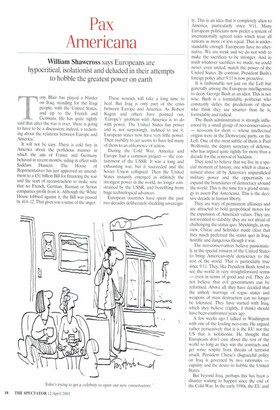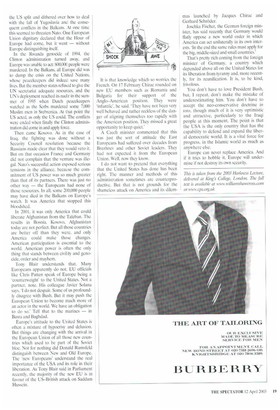Pax Americana
William Shawcross says Europeans are hypocritical, isolationist and deluded in their attempts to hobble the greatest power on earth
T_ ony Blair has played a blinder on Iraq, standing for the Iraqi people, with the United States, and up to the French and
Germans. He has quite rightly said that after the war is over. 'there is going to have to be a discussion; indeed, a reckoning about the relations between Europe and America.'
It will not be easy. There is cold fury in America about the perfidious manner in which the axis of France and Germany behaved in recent months, siding in effect with Saddam Hussein. The House of Representatives has just approved an amendment to a £51 billion Bill for financing the war and the start of reconstruction to make sure that no French, German, Russian or Syrian companies profit from it. Although the White House lobbied against it, the Bill was passed by 414-12. That Oyes you a sense of the anger. These wounds will take a long time to heal. But Iraq is only part of the crisis between Europe and America. As Robert Kagan and others have pointed out, 'Europe's' problem with America is to do with power. The United States has power and is, not surprisingly, inclined to use it. European states now have very little power. Their inability to act seems to have led many of them to an abhorrence of action.
During the Cold War, America and Europe had a common project — the containment of the USSR. It was a long and exhausting war, but it succeeded and the Soviet Union collapsed. Then the United States instantly emerged as infinitely the strongest power in the world, no longer constrained by the USSR, and benefiting from huge technological advances.
European countries have spent the past two decades deliberately shedding sovereign
ty. This is an idea that is completely alien to America, particularly since 9/11. Many European politicians now prefer a system of internationally agreed rules which treat all nations as more or less equal. That is understandable enough. Europeans have no alternative. We are weak and we do not wish to make the sacrifices to be stronger. And in truth whatever sacrifices we made, we could never, even united, match the power of the United States. By contrast, President Bush's foreign policy after 9/11 is now proactive.
It is fashionable not just on the Left but generally among the European intelligentsia to decry George Bush as an idiot. This is not wise. Bush is a formidable politician who constantly defies the predictions of those who think they are smarter than he is; formidable and radical.
The Bush administration is strongly influenced by a small group of neo-conservatives — neo-cons for short — whose intellectual origins were in the Democratic party, on the Left. One of the most subtle of them is Paul Wolfowitz, the deputy secretary of defense, who has argued quite rightly for more than a decade for the removal of Saddam.
They tend to believe that we live in a special moment of history, one which is characterised above all by America's unparalleled military power and the opportunity to expand the boundaries of democracy around the world. This is the time for a grand strategy to assert Pax Americana. This is the decisive decade in human liberty.
They are wary of permanent alliances and are attracted to bold geopolitical moves for the expansion of American values. They are not wedded to stability; they are not afraid of challenging the status quo. Shockingly, in my view, Chirac and Schroder made clear that they much preferred the status quo in Iraq, horrific and dangerous though it was.
The neo-conservatives believe passionately in the special mission of the United States to bring American-style democracy to the rest of the world. That is particularly true since 9/11. They, like President Bush, tend to see the world in very straightforward terms — even in terms of good and evil. They do not believe that evil governments can be reformed. Above all, they have decided that the unholy marriage of rogue states and weapons of mass destruction can no longer be tolerated. They have started with Iraq, which they believe (rightly. I think) should have been confronted years ago.
A few weeks ago I talked in Washington with one of the leading neo-cons. He argued rather persuasively that it is the EU not the US that is isolationist. He thought that Europeans don't care about the rest of the world so long as they win the contracts and get some respite from threats of terrorist attack. President Chirac's disgraceful policy on Iraq is governed by two rationales — cupidity and the desire to hobble the United States.
But beyond Iraq, perhaps this has been a disaster waiting to happen since the end of the Cold War. In the early 1990s, the EU and the US split and dithered over how to deal with the fall of Yugoslavia and the consequent conflicts in the Balkans. At one time this seemed to threaten Nato. One European Union dignitary declared that the Hour of Europe had come, but it went — without Europe distinguishing itself.
In the Rwanda genocide of 1994, the Clinton administration turned away, and Europe was unable to act: 800,000 people were murdered. In the Balkans, all Europe did was to dump the crisis on the United Nations, whose peacekeepers did indeed save many lives. But the member states refused to give the UN secretariat adequate resources, and the UN's deployment reached its nadir in the summer of 1995 when Dutch peacekeepers watched as the Serbs murdered some 7,000 Muslim men in Srebrenica. At that point the US acted, as only the CS could. The conflicts were ended when finally the Clinton administration did come in and apply force.
Then came Kosovo. As in the case of Iraq, the fighting was done without a Security Council resolution because the Russians made clear that they would veto it. But on that occasion France and Germany did not complain that the venture was illegal. Nato's successful action exposed serious tensions in the alliance, because the commitment of US power was so much greater than that of its partners. There was just no other way — the Europeans had none of those resources. In all, some 200,000 people may have died in the Balkans on Europe's watch. It was America that stopped this bloodshed.
In 2001, it was only America that could liberate Afghanistan from the Taleban. The results in Bosnia, Kosovo, Afghanistan today are not perfect. But all those countries are better off than they were, and only America could make those changes. American participation is essential to the world. American power is often the only thing that stands between civility and genocide, order and mayhem.
Tony Blair understands that. Many Europeans apparently do not. EU officials like Chris Patten speak of Europe being a 'counterweight' to the United States. Not a partner, note. His colleague Javier Solana says, 'I do not despair. Some of us profoundly disagree with Bush. But it may push the European Union to become much more of an actor in the world. We have an obligation to do so.' Tell that to the marines — in Basra and Baghdad.
Europe's attitude to the United States is often a mixture of hypocrisy and delusion. But things are changing with the arrival in the European Union of all those new countries which used to be part of the Soviet bloc. Not for nothing did Donald Rumsfeld distinguish between New and Old Europe. The 'new Europeans' understand the real importance of the USA and its role in their liberation. As Tony Blair said in Parliament recently, the majority of the new EU is in favour of the US-British attack on Saddam Hussein. It is that knowledge which so worries the French. On 17 February Chirac rounded on new EU members such as Romania and Bulgaria for their support of the Anglo-American position. They were 'infantile', he said. They have not been very well behaved and rather reckless of the danger of aligning themselves too rapidly with the American position. They missed a great opportunity to keep quiet.'
A Czech minister commented that this was just the sort of attitude the East Europeans had suffered over decades from Brezhnev and other Soviet leaders. They had not expected it from the European Union. Well, now they know.
I do not want to pretend that everything that the United States has done has been right. The manner and methods of this administration sometimes are counterproductive. But that is not grounds for the shameless attack on America and its dilem
mas launched by Jacques Chirac and Gerhard Schroder.
Joschka Fischer, the German foreign minister, has said recently that Germany would flatly oppose a new world order in which America can act unilaterally in its own interests. 'In the end the same rules must apply for the big, middle-sized and small countries.'
That's pretty rich coming from the foreign minister of Germany. a country which depended above all on the United States for its liberation from tyranny and, more recently, for its reunification. It is, to be kind, frivolous.
You don't have to love President Bush, but, I repeat, don't make the mistake of underestimating him. You don't have to accept the neo-conservative doctrine in tato, though much of it is very optimistic and attractive, particularly to the Iraqi people at this moment. The point is that the USA is the only country that has the capability to defend and expand the liberal democratic world. It is a vital force for progress. in the Islamic world as much as anywhere else.
Europe can never replace America. And if it tries to hobble it, Europe will undermine if not destroy its own security.
This is taken from the 2003 Harkness Lecture, delivered at King's College, London. The full text is available at www.williamshawcross.com or www.cps.org.uk



































































 Previous page
Previous page